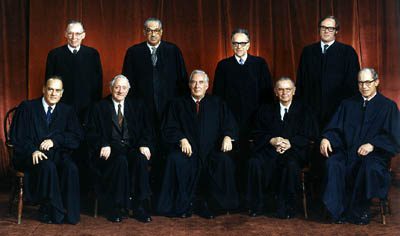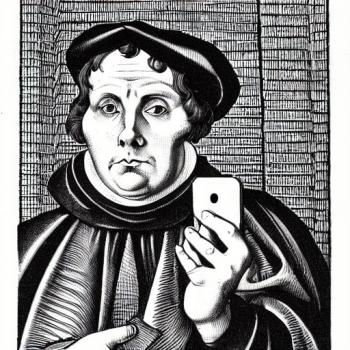The supporters of the 1973 decision legalizing abortion say that religious considerations should not be allowed to sway the court. But a historian has shown how Roe v. Wade was itself decided in line with the religion of the justices of the time.
He points out that in 1973, there was one Catholic on the bench, 3 Episcopalians, 3 Presbyterians, 1 Methodist, and 1 Lutheran. That is to say, all but one were mainline Protestants. (The Lutheran, William Rehnquist, was a member of a congregation that would belong to the ELCA.)
Those church bodies were strongly committed to the “liberal” social gospel, with its ideals of civil rights, democracy, and individual freedom. More than that, though, mainline Protestants back then were committed to liberal theology, particularly to its existentialist variety, which emphasized the centrality of radical freedom and the spiritual necessity of choice.
Roe vs. Wade was, in fact, decided on that basis, on the alleged right of the mother–and her doctor–to make their own free moral decisions, apart from any considerations of law or moral absolutes.
Liberal Protestants had already come out in favor of legalized abortion before Roe v. Wade. Prof. Williams quotes the Presbyterians saying that since God created us with moral agency, nothing should be allowed to interfere with the woman’s decision. The Methodists ruled that abortion is permissible in 1970, three years before the issue came to the court.
Justice Harry Blackmun, who authored the Roe v. Wade decision, was a devout, church-going Methodist, who sometimes preached in services. Prof. Williams gives a close account of his faith and his reasoning in the case. In his decision, he indicated that he thought that most “organized” religious groups that have taken a position on the issue came down in favor of abortion, skimming over Catholicism and assuming that the religious groups he was familiar with–namely, Methodists and other liberal Protestants–were representative of Protestantism as a whole.
After their 7-2 decision, the Justices were reportedly surprised by the reaction and the controversy that ensued. Prof. Williams observes that mainline Protestantism was so engrained in American culture at the time that the Justices assumed that they were basing their ruling on universally-accepted beliefs and that they were probably unaware of how their distinct religious beliefs were influencing their decision.
I was glad to see that the Lutheran on the court, Justice Rehnquist dissented. from Roe vs. Wade, as did one of the Episcopalians, Justice Byron White. (The Catholic, Justice William Brennan, voted with the majority.)
Catholic Democrats, at first, opposed the decision. So, commented Prof. Williams, did Black Protestants, “whose own tradition was shaped less by the value of personal choice, and more by the value of equity for the marginalized.”
Photo: Official Portrait of the Justices of the U.S. Supreme Court, 1973, Public Domain, https://commons.wikimedia.org/w/index.php?curid=582196

















